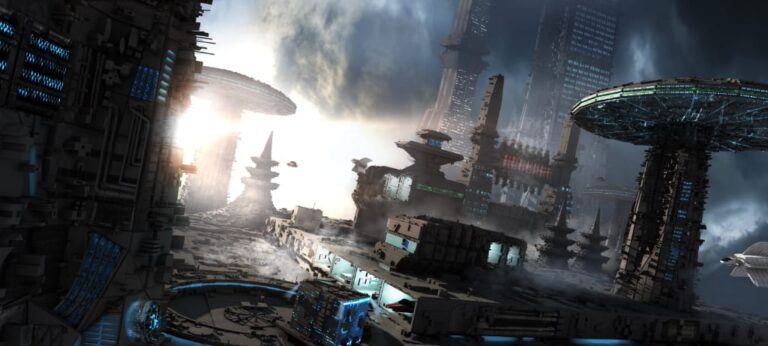Science fiction is a genre of speculative fiction that typically deals with imaginative and futuristic concepts such as advanced science and technology, space exploration, time travel, parallel universes, and extraterrestrial life. It often explores the potential consequences of scientific, social, and technological innovations. Science fiction can be found in books, comics, movies, TV shows, and video games.
Science fiction often uses the setting of the future or a fictional universe to explore a wide range of themes, such as the impact of technology on society and the human condition, the nature of humanity and consciousness, and the possibilities and limitations of space exploration and colonization. Many science fiction stories also include elements of adventure, mystery, and suspense, and often involve characters who are struggling against a dystopian or oppressive society, or working to save humanity from some catastrophic event.
The genre of science fiction is often distinguished from fantasy and horror by its use of science and technology as the basis for the story’s plot, setting, and characters, rather than supernatural or occult elements. Science fiction also differs from other genres of speculative fiction, such as alternate history and steampunk, which also deal with similar themes, but in different ways.
Here is a list of 20 top sci-fi writers with brief descriptions and famous novels:
Isaac Asimov
Known for his Foundation series and I, Robot, Asimov was an influential science fiction author who wrote over 500 books, including novels, non-fiction, and reference works.
Arthur C. Clarke
Known for 2001: A Space Odyssey, Clarke was an accomplished science fiction author and futurist who wrote over 100 books and numerous essays and articles on science and technology.
Philip K. Dick
Known for Do Androids Dream of Electric Sheep? (later adapted into the movie Blade Runner), Dick was a prolific science fiction author who wrote over 40 novels and 121 short stories.
H.G. Wells
Known for The Time Machine, The Invisible Man, and The War of the Worlds, Wells was a pioneer of science fiction who wrote over 50 novels and numerous non-fiction works.
Jules Verne
Known for Around the World in Eighty Days and Journey to the Center of the Earth, Verne was a pioneer of science fiction and adventure literature.
George Orwell
Known for 1984, Orwell was a British novelist, essayist, journalist and critic, whose work is marked by lucid prose, awareness of social injustice, opposition to totalitarianism, and outspoken support of democratic socialism.
Aldous Huxley
Known for Brave New World, Huxley was an English writer, novelist, philosopher, and prominent member of the Huxley family. He wrote nearly fifty books —both novels and non-fiction works— as well as wide-ranging essays, narratives, and poems.
Ray Bradbury
Known for Fahrenheit 451, Bradbury was an American author and screenwriter who wrote over 27 novels and story collections, including The Martian Chronicles and Something Wicked This Way Comes.
Robert A. Heinlein
Known for Stranger in a Strange Land, Heinlein was an American science fiction author, aeronautical engineer, and retired naval officer. He wrote over 50 novels and short stories, including Starship Troopers and The Moon is a Harsh Mistress.
Neal Stephenson
Known for Snow Crash and The Diamond Age, Stephenson is an American author and game designer known for his works of speculative fiction, which have been variously categorized as science fiction, historical fiction, cyberpunk, and postcyberpunk.
Orson Scott Card
Known for Ender’s Game, Card is an American science fiction author, critic, public speaker, essayist, and columnist.
Frank Herbert
Known for Dune, Herbert was an American science fiction author best known for the Dune series.
Octavia Butler
Known for Kindred and Dawn, Butler was an American science fiction author, one of the best-known among the few African-American women in the field.
Douglas Adams
Known for The Hitchhiker’s Guide to the Galaxy, Adams was an English author, scriptwriter, essayist, humorist, and dramatist.
William Gibson
Known for Neuromancer, Gibson is an American-Canadian speculative fiction writer, known for his contributions to the cyberpunk subgenre.
Ursula K. Le Guin
Known for The Left Hand of Darkness, Le Guin was an American author of speculative fiction, realistic fiction, non-fiction, screenplays, librettos, poems, essays, speeches, translations, literary critiques, chapbooks, and children’s books.
Dan Simmons
Known for Hyperion, Simmons is an American author of science fiction and horror novels, known for his Hyperion Cantos and Ilium/Olympos cycles.
Margaret Atwood
Known for The Handmaid’s Tale, Atwood is a Canadian author, poet, literary critic, essayist, and inventor.
Alastair Reynolds
Known for Revelation Space, Reynolds is a British science fiction author. He specialises in hard science fiction, space opera and the noir.
Lois McMaster Bujold
Known for the Vorkosigan Saga, Bujold is an American speculative fiction author, known for her works of science fiction and fantasy.
Please note that this list is subjective and based on popularity, influence, and impact on the science fiction genre. Other sci-fi writers may also be highly regarded by critics and fans.
